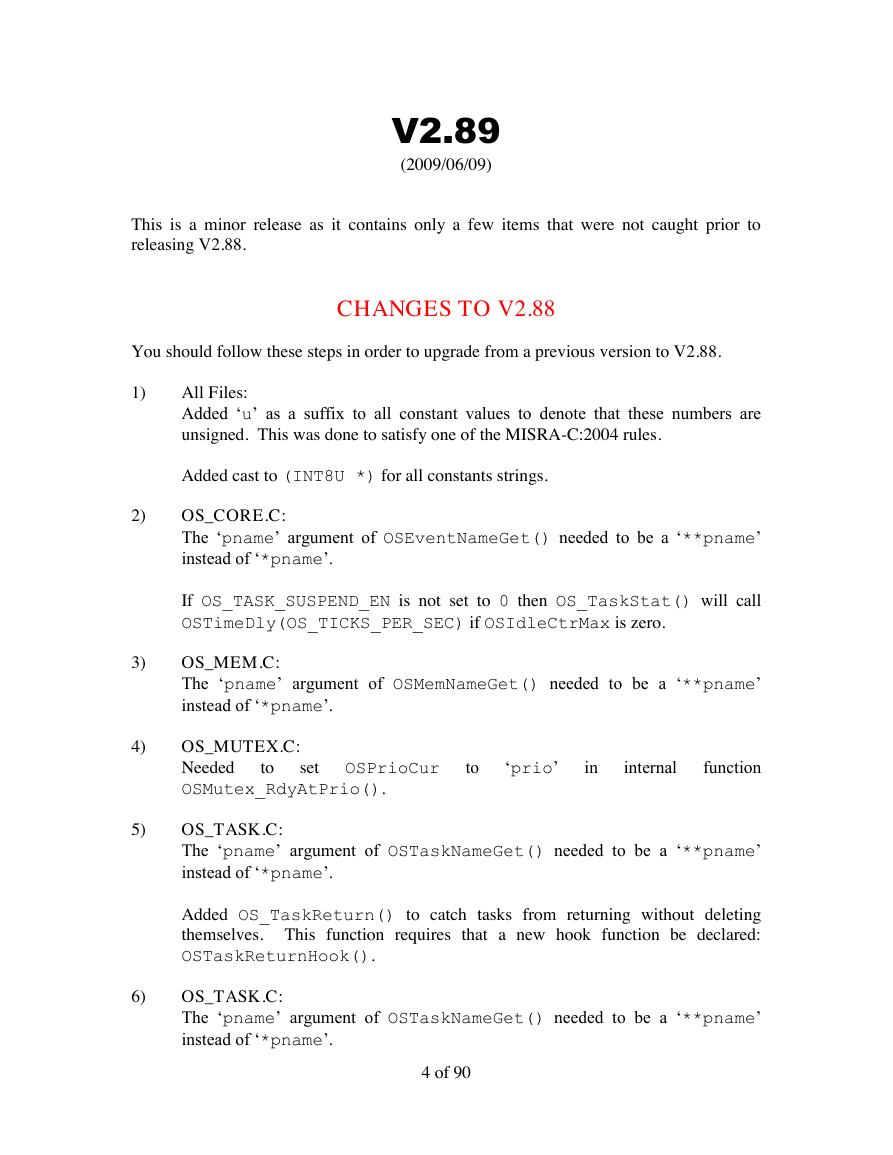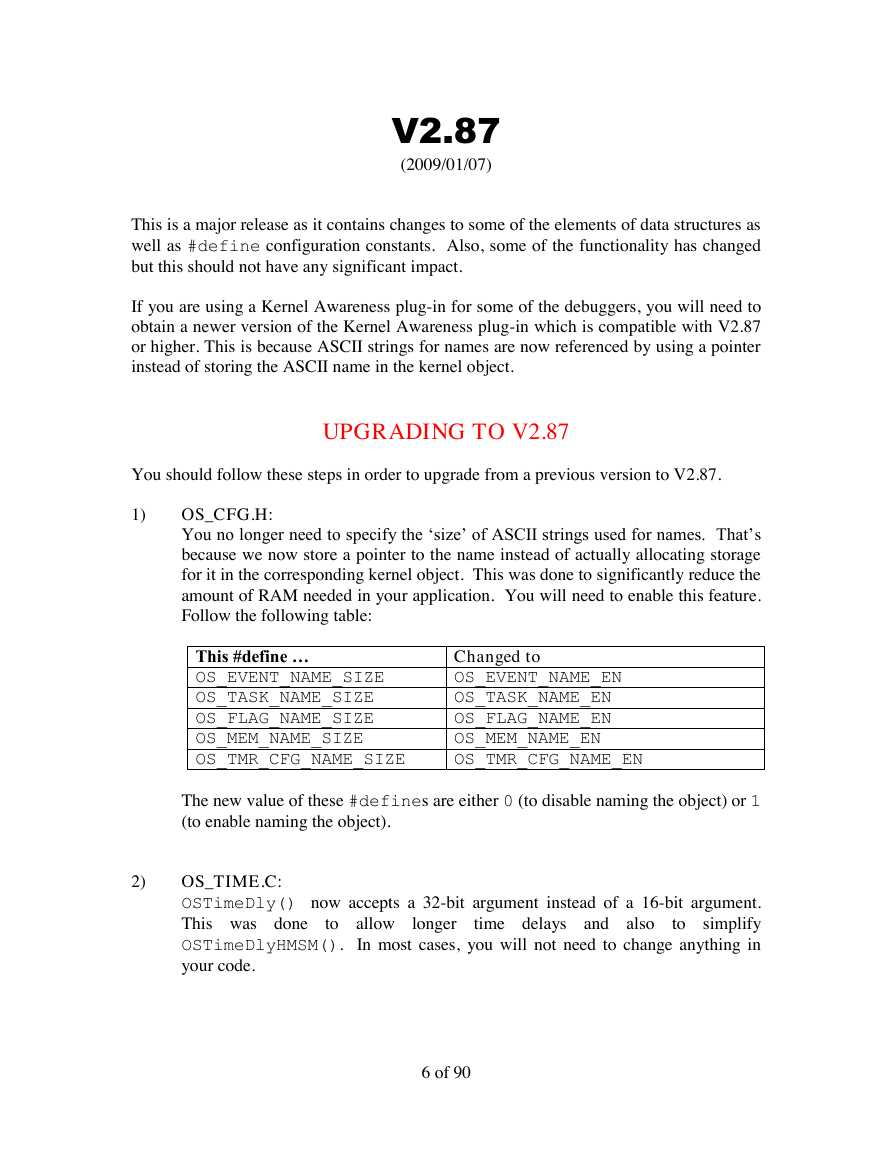Micriµm
949 Crestview Circle
Weston, FL 33327
U.S.A.
www.Micrium.com
µC/OS-II
The Real-Time kernel
V2.90
Release Notes
© Copyright 2010, Micriµm
All Rights reserved
FAX: +1 954 217 2037
Phone: +1 954 217 2036
1 of 90
�
V2.90
(2010/05/18)
This is a minor release as it contains only a few items that were not caught prior to
releasing V2.89.
CHANGES TO V2.89
You should follow these steps in order to upgrade from a previous version to V2.89.
1)
OS_CORE.C:
Added OSSafetyCriticalStart() to indicate that all initialization has
been completed and that kernel objects are no longer allowed to be created.
2)
3)
4)
5)
6)
All Files:
Modified the source code to reduce the number of MISRA-C 2004 rules not
respected:
8.5 - there shall be no definition of objects or functions in a header file
14.7 - a function should have a single point of exit
15.2 - every non-empty case clause in a switch statement shall be terminated
with a break statement
15.4 - only one case - a switch expression should not represent a Boolean value
17.4 - array indexing shall only be applied to objects defined as an array type
17.4 - pointer arithmetic should not be used
uCOS_II.H:
Corrected compilation error when OS_EVENT_EN is disabled and OS_FLAG_EN
is enabled.
OS_FLAG.C:
Replaced safety critical test to check OSSafetyCriticalStartFlag set by
OSSafetyCriticalStart() on OSFlagCreate().
OS_MBOX.C:
Replaced safety critical test to check OSSafetyCriticalStartFlag set by
OSSafetyCriticalStart() on OSMboxCreate().
OS_MEM.C:
Replaced safety critical test to check OSSafetyCriticalStartFlag set by
OSSafetyCriticalStart() on OSMemCreate().
2 of 90
�
7)
8)
9)
OS_MUTEX.C:
Replaced safety critical test to check OSSafetyCriticalStartFlag set by
OSSafetyCriticalStart() on OSMutexCreate().
OS_Q.C:
Replaced safety critical test to check OSSafetyCriticalStartFlag set by
OSSafetyCriticalStart() on OSQCreate().
OS_SEM.C:
Replaced safety critical test to check OSSafetyCriticalStartFlag set by
OSSafetyCriticalStart() on OSSemCreate().
10) OS_TASK.C:
on
Replaced safety critical test to check OSSafetyCriticalStartFlag set by
OSSafetyCriticalStart()
and
OSTaskCreate().
OSTaskCreateExt()
11) OS_TMR.C:
Replaced safety critical test to check OSSafetyCriticalStartFlag set by
OSSafetyCriticalStart() on OSTmrCreate().
3 of 90
�
V2.89
(2009/06/09)
This is a minor release as it contains only a few items that were not caught prior to
releasing V2.88.
CHANGES TO V2.88
You should follow these steps in order to upgrade from a previous version to V2.88.
1)
All Files:
Added „u‟ as a suffix to all constant values to denote that these numbers are
unsigned. This was done to satisfy one of the MISRA-C:2004 rules.
Added cast to (INT8U *) for all constants strings.
2)
3)
4)
5)
6)
OS_CORE.C:
The „pname‟ argument of OSEventNameGet() needed to be a „**pname‟
instead of „*pname‟.
If OS_TASK_SUSPEND_EN is not set to 0 then OS_TaskStat() will call
OSTimeDly(OS_TICKS_PER_SEC) if OSIdleCtrMax is zero.
OS_MEM.C:
The „pname‟ argument of OSMemNameGet() needed to be a „**pname‟
instead of „*pname‟.
OS_MUTEX.C:
Needed
OSMutex_RdyAtPrio().
set
to
OSPrioCur
to
„prio‟
in
internal
function
OS_TASK.C:
The „pname‟ argument of OSTaskNameGet() needed to be a „**pname‟
instead of „*pname‟.
Added OS_TaskReturn() to catch tasks from returning without deleting
themselves. This function requires that a new hook function be declared:
OSTaskReturnHook().
OS_TASK.C:
The „pname‟ argument of OSTaskNameGet() needed to be a „**pname‟
instead of „*pname‟.
4 of 90
�
V2.88
(2009/01/21)
This is a minor release as it contains only a few items that were not caught prior to
releasing V2.87.
CHANGES TO V2.87
You should follow these steps in order to upgrade from a previous version to V2.87.
1)
OS_CORE.C:
OSIntExit() and OS_Sched() have changed slightly because of a boundary
condition found with the Cortex-M3 port. Specifically, we needed to move the
statement:
2)
3)
OSTCBHighRdy = OSTCBPrioTbl[OSPrioHighRdy];
Before testing for the priority.
uCOS_II.H:
The function prototype for OSEventPendMulti() incorrectly declared the
timeout as an INT16U instead of an INT32U since we changed all time delays
and timeouts to now use 32-bit values.
All Files:
Changed the way functions are declared to be consistent with the prototypes in
ucos_ii.h.
5 of 90
�
V2.87
(2009/01/07)
This is a major release as it contains changes to some of the elements of data structures as
well as #define configuration constants. Also, some of the functionality has changed
but this should not have any significant impact.
If you are using a Kernel Awareness plug-in for some of the debuggers, you will need to
obtain a newer version of the Kernel Awareness plug-in which is compatible with V2.87
or higher. This is because ASCII strings for names are now referenced by using a pointer
instead of storing the ASCII name in the kernel object.
UPGRADING TO V2.87
You should follow these steps in order to upgrade from a previous version to V2.87.
1)
OS_CFG.H:
You no longer need to specify the „size‟ of ASCII strings used for names. That‟s
because we now store a pointer to the name instead of actually allocating storage
for it in the corresponding kernel object. This was done to significantly reduce the
amount of RAM needed in your application. You will need to enable this feature.
Follow the following table:
2)
This #define …
OS_EVENT_NAME_SIZE
OS_TASK_NAME_SIZE
OS_FLAG_NAME_SIZE
OS_MEM_NAME_SIZE
OS_TMR_CFG_NAME_SIZE
Changed to
OS_EVENT_NAME_EN
OS_TASK_NAME_EN
OS_FLAG_NAME_EN
OS_MEM_NAME_EN
OS_TMR_CFG_NAME_EN
The new value of these #defines are either 0 (to disable naming the object) or 1
(to enable naming the object).
OS_TIME.C:
OSTimeDly() now accepts a 32-bit argument instead of a 16-bit argument.
This was done
to simplify
OSTimeDlyHMSM(). In most cases, you will not need to change anything in
your code.
time delays and also
to allow
longer
6 of 90
�
3)
4)
5)
6)
7)
8)
9)
OS_CORE.C:
OS_StrCopy() has been eliminated since it‟s no longer used by µC/OS-II.
You should not have been using this function in your code since it was meant to
be an internal function. This change should thus not cause any problem.
specific
registers.
OS_CORE.C:
as
Added
task
OS_TASK_REG_TBL_SIZE 32-bit unsigned registers for each task. These
registers ARE NOT the same as the CPU registers; they are more like task
specific variables. These „registers‟ are typically used for such things as „error
codes‟ (or errno in other operating systems). You can also communicate
information to tasks via these registers.
as many
You
can
have
OS_MBOX.C:
Timeouts on OSMboxPend() are now 32-bit values.
OS_MUTEX.C:
Timeouts on OSMutexPend() are now 32-bit values.
OS_Q.C:
Timeouts on OSQPend() are now 32-bit values.
OS_SEM.C:
Timeouts on OSSemPend() are now 32-bit values.
OS_TASK.C:
item 4 above) by calling
You can set and get
OSTaskRegSet() and OSTaskRegGet(), respectively. Again, task registers
ARE NOT the same as CPU registers.
registers (see
task
10) OS_TMR.C:
and OSTmr_Unlock() have been
OSTmr_Lock()
replaced with
OSSchedLock() and OSSchedUnlock(), respectively. Now, timers no
longer need to rely on semaphores being available. Also, this allows you to call
other timer services from the timer callback.
7 of 90
�
V2.86
(2007/09/12)
This is a major release as it contains a new feature called „Multi-Pend‟ (implemented in
OSEventPendMulti()) which allows a task to pend on multiple objects (semaphores,
mailboxes or queues). If any one of those objects is posted to, the function returns and
indicates which (or all) events posted.
Multi-pend is the only feature added in this version and a number of changes throughout
the code has been implemented in order to support this new feature.
Details on how to use OSEventPendMulti() can be found in the µC/OS-II reference
manual.
UPGRADING TO V2.86
You should follow these steps in order to upgrade from a previous version to V2.86.
Even though only Multi-Pend was added in V2.86, some of the items below are repeated
from previous versions because they are important to follow.
1)
Timer Manager:
Timers MUST now be created by OSTmrCreate() before they can be used. In
V2.82, a timer was created and started when you called OSTmrStart(). Now
you MUST call OSTmrCreate() and then OSTmrStart() to create and start
the timer, respectively.
It is now your responsibility to delete a timer when it is no longer being used.
The Timer Manager user-available functions are now:
OSTmrCreate()
OSTmrDel()
OSTmrNameGet()
OSTmrRemainGet()
OSTmrStart()
OSTmrStop()
To create and start a timer, you need to call OSTmrCreate() and then
OSTmrStart(). When you are done using a timer, you can delete it by calling
OSTmrDel().
8 of 90
�















